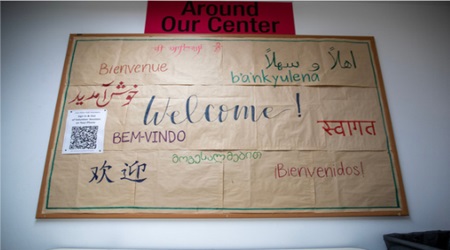Pima County closing asylum seeker respite centers

PIMA COUNTY, (Jan. 24, 2025) – Pima County Administrator Jan Lesher notified the Board of Supervisors Jan. 23 that she is closing the County’s Respite Centers used to provide temporary sheltering and transportation services to Legally Processed Asylum Seekers released into Southern Arizona by the U.S. Border Patrol. Since Monday, USBP has not released any asylum seekers to Pima County, which will cause Respite Center censuses to fall to zero by this weekend.
An empty shelter puts the County in a bind.
“This puts the County in a very precarious financial position,” Lesher wrote the Board in her memo. “Whether there are people under shelter or not, the County still incurs operational costs from its contractors for staffing readiness, shelter amenity rentals (such as the portable showers), heating and cooling costs, and more. With no guests in the facility for which the County could be reimbursed, the County General Fund would have to cover those operational costs.”
She said the County is reimbursed by the U.S. Department of Homeland Security’s Shelter Services Program or SSP. Under SSP rules, the County can only receive reimbursements when people receive shelter services. DHS won’t pay for keeping an empty shelter on standby in case there are future LPAS releases. Moreover, part of an Executive Order signed by President Trump Jan. 20 indicates federal funding programs like SSP may be paused while fund recipients are audited, further endangering the County’s budget.
“There are scores of SSP fund recipients nationwide and these reviews and audits could take a considerable period. [The] Grants Management and Innovation [Department] is concerned this ambiguous language could mean qualified SSP reimbursements may be paused immediately, even for incurred expenses prior to January 20,” Lesher told the Board.
The Board of Supervisors has directed that County taxes not be used to pay bills associated with federal border policy. As a result, the County has sought and received more than $117 million from the federal government to pay for the County’s Temporary Sheltering Program and all its ancillary costs. To protect the County budget, she said she ordered the two Respite Centers on Ajo and Drexel roads to close by midnight, Jan. 26. That will give the remaining asylum seekers in the shelters who arrived before Jan. 20 time to complete their travel plans and depart for their destination cities.
In addition to notifying the Board on Thursday, Lesher directed that all County contractors, partners, and stakeholders involved throughout the state in keeping asylum seekers off the streets be told the County is closing its shelters and ending its coordination role. The shelters are:
- Respite Center – Drexel, 1186 W. Drexel Road, can accommodate up to 600 people.
- Respite Center—Ajo, 2225 E. Ajo Way, can accommodate about 90 to 100 people. It is operated by Catholic Community Services and is called Casa Alitas by that agency.
Lesher finished her memo with a note to the Board saying the past six years have been the County’s finest hour.
“This will likely bring to a close one of the most significant humanitarian aid programs undertaken by Pima County and its regional partners in the County’s history,” she wrote. “Without the County’s leading role coordinating and obtaining the funding for the Temporary Shelter Program, more than a half-million people over the past six and a half years would have been left to fend for themselves on the streets of Tucson, Nogales, Douglas, and elsewhere in Southern Arizona. This noble and humane program has involved dozens of County and city of Tucson staff, numerous local governments and nongovernmental agencies, and the kind and tireless contributions of hundreds of volunteers.”
“No other border community in the country achieved what Pima County and Tucson have over the past six years of this stressful and persistent humanitarian crisis. I hope you are as proud as I am about how the people of Pima County came together in a time of crisis to prevent suffering while also protecting our community,” Lesher said.
Board Chair Rex Scott agreed with Lesher and offered on behalf of the Board appreciation and gratitude to every agency and person who has been involved in the humane treatment of desperate people since the crisis began in 2019.
“While Pima County took a lead role in providing the financial and logistical support for this program, it is important to acknowledge that this was a community effort. The people of Pima County and Arizona worked together to solve a crisis. The Democratic and Republican members of the state’s Congressional delegation, Department of Homeland Security agencies, the state, our fellow border counties, the City of Tucson, numerous nonprofit organizations, most notably Catholic Community Services, private sector shelter contractors, and many hundreds of generous volunteers all significantly contributed to the program’s success and did their part to do what is right and decent. I, too, am immensely proud of everyone and every agency that participated,” Scott said.
Scott added that a lot remains unknown about the course of federal border policy under the new Trump Administration and that it is unlikely this past week signals the end of border crossings, whether legal or illegal. He said he holds out hope that no matter what the policy is, any border crossers encountered by the federal government in Pima County are treated with the same kindness, decency and generosity as they were when in the temporary care of Pima County and its sheltering coalition partners.
To learn more about the history of the County’s involvement in coordinating the temporary sheltering of asylum seekers and the creation of the County’s Temporary Shelter Program, read: A Coalition of Kindness – How the County kept 500,000 people off the streets